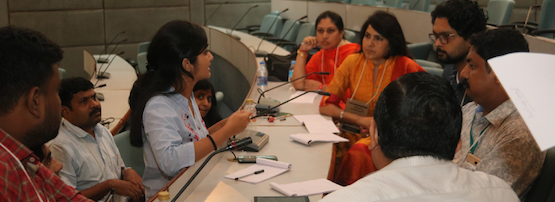
The 2017 edition of the India School on Internet Governance aimed to build a community of Internet governance professionals in India and South Asia who can effectively participate in global Internet governance processes.
Around 88 participants, including 63 fellows, participated in the three-day event held in Trivandrum, Kerala, from 24 to 26 October. This edition also involved participants from Afghanistan, Bangladesh, Nepal, Singapore and Sri Lanka.
Attendees were inspired by the 15 local and international speakers who shared the latest technological, sociological and legal thinking, and challenged participants to unpack the norms of Internet governance.
Insig 2017 day 3, Session-1 “Participating in Global IG Processes”. Let’s talk about how to engage & contribute in Global IG Process. pic.twitter.com/y3z48M8E1l
— Gauravashk’s View (@gauravashk) October 26, 2017
There were several interactive sessions discussing a wide variety of Internet governance themes including access, human rights, the multistakeholder process and cybersecurity.
The latter of these themes drew a number of questions from attendees, many of whom were particularly interested in the associated technologies including the DNS, the Dark Web, cryptocurrencies and blockchain technology.
During her presentation on cybersecurity and governance, ICANN Board member, Asha Hemrajani, discussed how more needs to be done to ensure the security of end users, not just for their own protection but the protection of the general public worldwide. Asha said that this is becoming an even greater issue with the rise of the Internet of Things (IoT), which she said would benefit from greater use of DNS security extensions (DNSSEC).
#insig2017 Asha Hemrajani, ICANN Board Member presentation on Security stressed commitment to DNSSEC deployment pic.twitter.com/WpngYn7xUi
— R S NITHIN (@nithinrajrs) October 26, 2017
DNSSEC improves the DNS by digitally signing DNS data and hence establishes a chain of trust. Ultimately, the DNS can provide a foundation for scalable security in the future. Working in the IoT sector this was a key takeaway for me, as I believe that DNSSEC will prove to be a major breakthrough in the history of IoT.
One of the most engaging sessions — I think everyone who participated would agree — was an Internet Shutdown roleplay organized by Anand Raje and Anupam Agrawal.
Not only was it a fun activity to get people up, moving and talking with different people in the group, it gave everyone a greater understanding of the dependencies and liabilities involved when a cybersecurity situation gets out of control, including the legal, civil, technical and business perspectives.
Do we need Internet shutdowns? Outcomes of the roleplay exercise @anandraje and @agrawal_anupam did at #insig2017 pic.twitter.com/YT9XDBY7jq
— Subhashish Panigrahi (@subhapa) October 24, 2017
Overall, inSIG 2017 was a great experience where we learned so much in such a short amount of time. Most importantly, we learned that the Internet community is far bigger than the little corners we work and study in.
Praneet Kaur is an IoT developer working for Smartron, an Indian startup.
The views expressed by the authors of this blog are their own and do not necessarily reflect the views of APNIC. Please note a Code of Conduct applies to this blog.

Its a great piece of article and overall description of the Cyber Security Role Play performed at inSIG 2017.
Keep it up Praneet!
Great work Praneet
Wonderful job Praneet.
Amazing articulation of thoughts and well put description of the workshop makes me even more eager to attend it.
Looking forward to more such blogs.